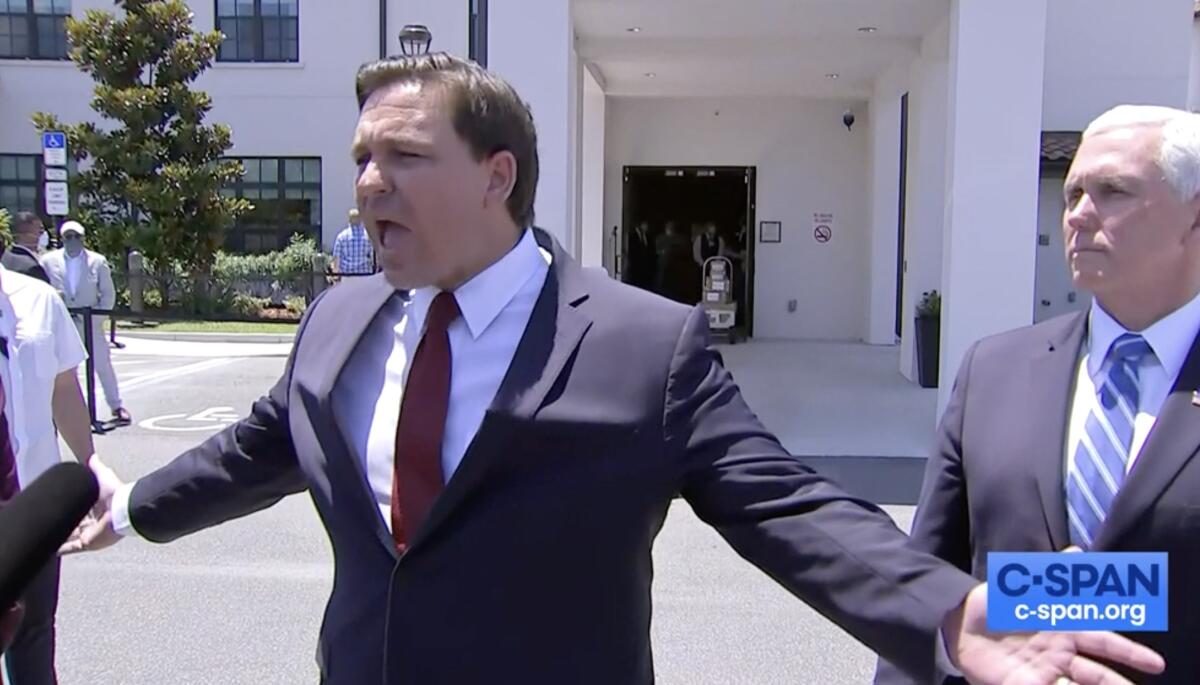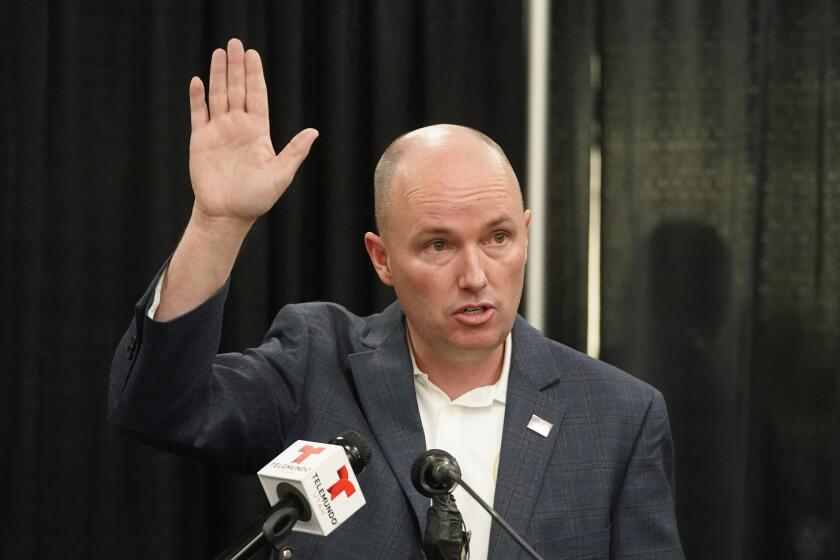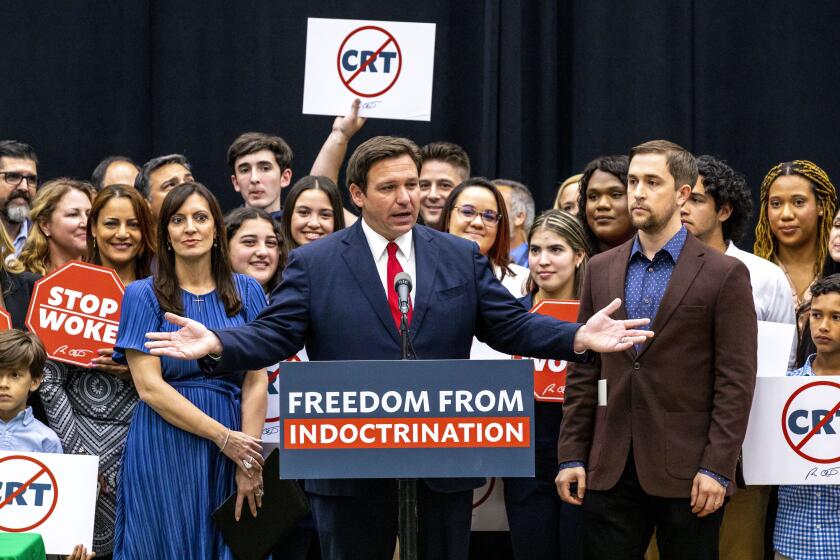Column: After caving to DeSantis on AP Black Studies, the College Board lied about their contacts

- Share via
The College Board, which has been trapped in a rumpus over whether it watered down its Advanced Placement course on African American Studies to mollify right-wing culture warriors, originally claimed that it got no feedback from Florida Gov. Ron DeSantis or anyone of his ilk before finalizing the course.
Here’s my message to the board: You’re busted.
An exchange of letters just released by the Florida Department of Education and the board itself reveals that the board actually had discussions with the state — and received feedback — as far back as January 2022.
The dialogue surrounding AP African American Studies has moved from healthy debate to misinformation.
— College Board
The letters point to repeated contacts between the College Board and state education officials over the content of the course throughout the year.
The College Board, stung by criticism that it allowed the right wing to dictate the content of its AP course, issued a ringing defense of the development of the course on Saturday.
Get the latest from Michael Hiltzik
Commentary on economics and more from a Pulitzer Prize winner.
You may occasionally receive promotional content from the Los Angeles Times.
Unfortunately, the board had already lost the PR battle with DeSantis, so its defense — including a mea culpa about its failure to push back against the Republican DeSantis’ “slander” that the course as finalized “lacks educational value” — falls flat.
As for the exchange of letters, evidently state officials told board representatives that some of the course content would violate Florida law, though they were always vague about the specifics.
The College Board repeatedly asked Florida for “feedback” about their exact objections. The state officials, however, merely pointed to state laws and instructional rules forbidding teachers or course materials to “indoctrinate” pupils about racial issues and advised the board to become familiar with the restrictions.
Several issues are raised by the contacts between the state and the board and the subsequent fallout. None of them makes the College Board look good as a defender of educational principles.
The issues don’t make the mulish bureaucrats at the Florida Department of Education look any better, but since it has long been obvious that the DeSantis administration is shot through with imbeciles, that’s not very newsworthy.
One issue pertains to the exchange of letters, which were first leaked, presumably at the state agency’s behest, to the Daily Caller, a right-wing opinion website co-founded by Fox News loudmouth Tucker Carlson in 2010. The first, from the Department of Education to the College Board, is dated Feb. 7; the College Board responded on Feb. 8.
On the first day of Black History month and after right-wing complaints, the College Board issues a watered-down Black studies curriculum. So much the worse for students.
The timing gives the game away: The state agency was pushing back at the College Board’s assertion that the dilution of its AP course had nothing to do with pressure from DeSantis, but followed sound pedagogical practice.
In DeSantis’ world, that won’t do: He wouldn’t want to be deprived of a single gram of credit for forcing a big organization like the College Board to abandon its “woke” instincts.
Another issue concerns a defensive gloss on the letters exchange that the board issued on Saturday. Much of that statement is in the vein of “move along; nothing to see here.”
The board frets that “the dialogue surrounding AP African American Studies has moved from healthy debate to misinformation.” It owns up to “mistakes in the rollout that are being exploited” by DeSantis, among others. It says it was “naive” not to call out Florida officials in September, when they first rejected the course without explaining why.
No kidding? In the words of Florida professor and blogger Alfred Soto, DeSantis has made no secret of his design to “obliterate public trust in education.” The College Board needed to stay armed against that the moment DeSantis started mouthing off. Instead, it tried appeasement. One would guess that the AP European history course covers how that worked in Munich 1938.
The board asserts that the changes made in the curriculum before it was finalized constitute “a significant improvement, rather than a watering down.”
Scholars may come to their own conclusions about that. But given that (according to the state) the board told Florida officials in November that topics such as “systemic marginalization” and “intersectionality” — which allude to the deep-seated racism latent in American society and culture — “could not be removed” from the course, and they’re no longer required topics, it’s certainly questionable.
As I pointed out earlier, the College Board’s efforts to deny it was influenced by DeSantis — or any “states or districts” — always was a smokescreen. DeSantis may have made his objections public in January, but he was riding a horse that already had been saddled up by the right-wing echo chamber.
Utah Gov. Cox stood firm against anti-transgender legislation last year. What made him sign a much harsher law this week?
The National Review, for example, had launched a broadside against the draft version of the course in September. The right had been throwing a conniption over “critical race theory,” a concept almost none of its critics have bothered to understand, for well more than a year; the board couldn’t be unaware that discussions about the sub rosa racism in America would rile up the fringes.
The board’s initial defense was overly cute. It said, “No states or districts have seen the official framework that is released.” But that’s a reference to the final version. As the board has acknowledged since, it had ongoing discussions with Florida officials about the content of the course throughout 2022.
In its Feb. 8 letter to the board, the Florida Department of Education mentions several points at which the agency mentioned specific topics in the draft; if the state officials hadn’t seen the draft or at least received a briefing, how would they know what was in it? In any case, the board acknowledges that it repeatedly sought “feedback” from the state about the course.
A few things remain murky about the interactions between the state and the board. In its letter, the board mentions a draft curriculum of the AP course it provided to state officials last July.
The only draft that seems to have been published is dated February 2022, and it’s unclear if these documents are the same or if changes were made between February and July.
Some purportedly objectionable items that Florida Education Commissioner Manny Diaz Jr. mentioned in a Jan. 20 tweet, including “Black Queer Studies,” were not in the July 2022 submission. But they are in the February version. I asked the College Board to explain the discrepancy and provide a copy of the July draft, but haven’t heard back.
The National Hockey League joins the club of powerful organizations letting themselves get bullied by Ron DeSantis.
Turning to the specifics, a provision of Florida’s education law enacted in November states forthrightly that “the teaching of Critical Race Theory, meaning the theory that racism is not merely the product of prejudice, but ... is embedded in American society and its legal systems” is unacceptable in the state. Also barred is material from the “1619 Project,” a New York Times package that placed American history in a racial context.
The rule states that schools “may not define American history as something other than the creation of a new nation based largely on universal principles stated in the Declaration of Independence.” At best, that’s a candy-colored version of American history — not, as the rule demands, instruction that is “factual and objective.”
What should the College Board have done, given this ideological assault on educational standards? The moment the Florida Department of Education told the board to read up on state laws, the board should have withdrawn the course from Florida’s consideration, since it was well understood that Florida laws, such as its speech-supressing “Stop WOKE Act,” are inconsistent with sound educational practice.
The AP course was slated to be tried out in only five to 12 Florida high schools, anyway. By engaging DeSantis’ minions in a debate about course content, the board set the stage for the controversy it now regrets.
The board’s torment should be an object lesson to any enterprise or organization contemplating doing business with DeSantis’ Florida. As a likely candidate for president running on the ignorance ticket, DeSantis is out to embarrass anyone coming into his state with a humane, inclusive, intelligent approach to life.
He’s already bullied the National Hockey League and the Special Olympics (of whose USA Games in Orlando he was honorary chairman) into submitting to his crabbed politics, and is in the process of harassing Walt Disney Co. over its commitment to antidiscrimination principles.
The board, in short, should have seen this one coming. Its failure to do so is its shame.
More to Read
Get the latest from Michael Hiltzik
Commentary on economics and more from a Pulitzer Prize winner.
You may occasionally receive promotional content from the Los Angeles Times.














